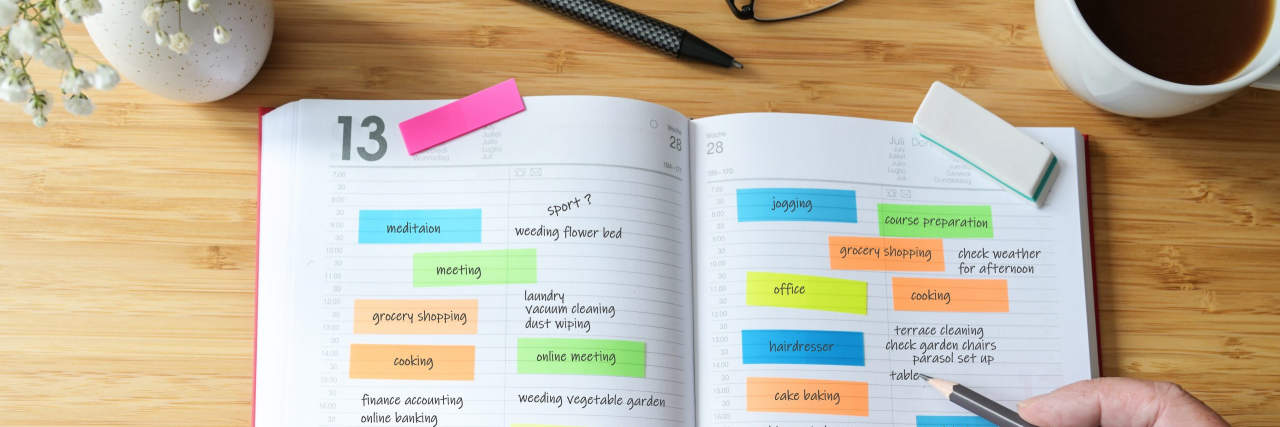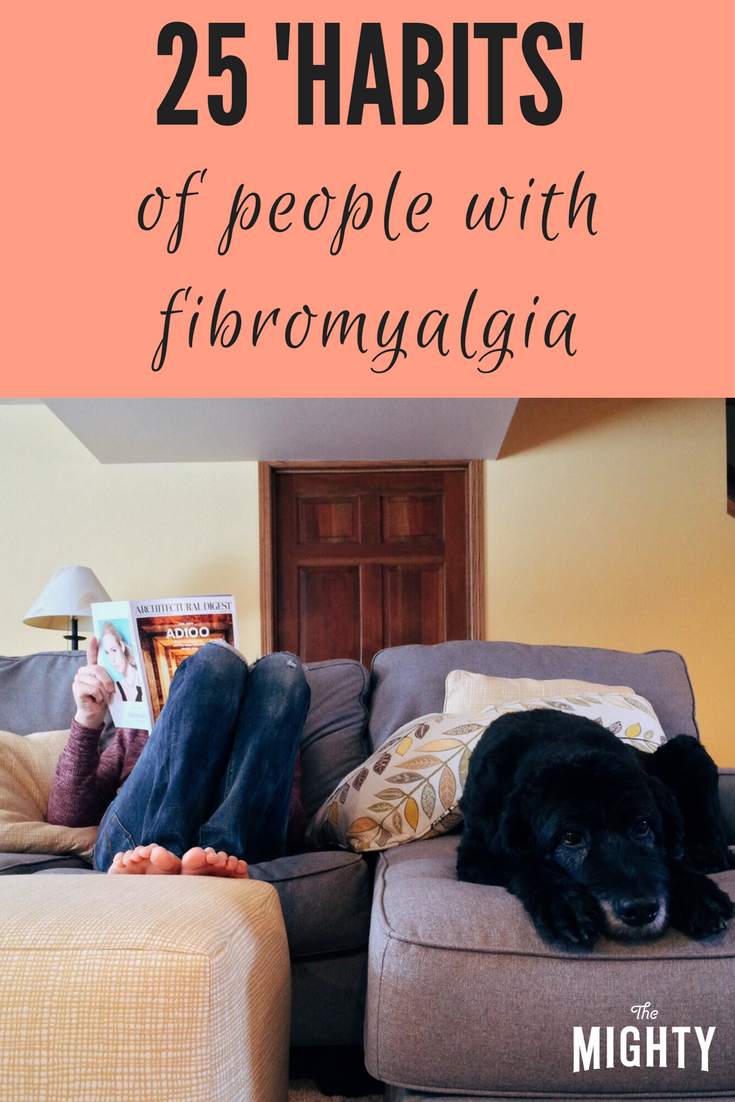When you develop fibromyalgia, or “fibro,” you might find yourself making some lifestyle changes to better accommodate your illness. Whether it’s chronic pain, fatigue, brain fog, or depression, the symptoms can affect nearly every aspect of your life. In order to manage these changes, many people may find themselves picking up “habits” or engaging in routine behaviors that help them through the physical and emotional challenges they face.
- What is Fibromyalgia?
- What Are Common Fibromyalgia Symptoms?
We asked our Mighty community to share some of the habits they’ve developed – good or bad – while living with fibromyalgia. Some of these may sound familiar to you, too. Let us know how you cope with fibro in the comments below.
Here’s what the community told us:
1. “I’ve developed a habit of not sharing my health issues with anyone, out of fear of mocking, judging or disbelief. It’s gotten so bad to the point that it’s not just [with] friends and family, it’s that sometimes I avoid telling doctors about some of my problems.”
2. “I don’t wear makeup (this could be a positive or negative), but when you get into bed multiple times a day, it’s not worth putting it on to just wipe it back off. Sleeping in it is no good.”
3. “I have a bad habit of grinding my teeth, biting my tongue, or locking my jaw when I’m concentrating or in pain. I won’t realize I’m doing it until I notice the pain in my face later.”
4. “No wake-up alarm, no morning appointments, and my phone set to silent during my normal sleep hours. (I have to do a morning appointment with a wake-up alarm every now and again, but my general rule is to avoid them.”
5. “At this point I would call being angry a habit. I feel like I’m ‘chronically’ angry. It seems like no one understands and everyone expects me to be a normal 20-year-old. I’ve had fibromyalgia and chronic fatigue since I was 4 years old…you’d think they’d all get it by now. So I’m angry.”
6. “Constantly checking the doors when I go out or to bed because I can’t be sure that I locked them.”
7. “When I’m having a ‘good’ day, I always overdo it. Every single time. I make myself do as much as possible before I literally collapse. I have so many days where all I can do is lay in bed, so when that elusive unicorn of a good day with mild pain comes around, I can’t help but try and do everything I’m usually missing out on. But I always pay for it dearly the next day, and even sometimes for a whole week.”
8. “I have on my mind constantly how to save steps. I only have so many in me (energy) and can’t afford extra steps if I am to make it through the day. I hate having to think about it all the time instead of just enjoying things as they come.”
9. “With my fibromyalgia, I have almost constant migraine symptoms. So I’ve developed the habit of covering my eyes if I see someone adjusting the lighting or if I walk into a room with motion-activated lights. Otherwise, the changes in lighting can be painful or overwhelming. I get some funny looks from people that don’t know me.”
10. “‘Packing’ for a quick trip out. I have to make sure I have water, my meds, a small pillow, a book, headphones, baby wipes (my medicine makes me sweaty), and any type of mint (meds make me nauseous). Small trips can become big deals quickly. I have to be prepared for any situation. My family now refers to my purse as the ‘Mary Poppins bag.’”
11. “[I’m in the habit of] saying, ‘I’m OK, just tired’ if anyone asks if something is wrong. Just ‘I’m OK’ if someone asks how I am in general.”
12. “Placing a pillow between my knees and/or behind my neck, under my arm, etc. My knees touching each other, my neck against the couch or bed or my skin touching a table can be so painful that I can’t get comfortable, so [I have] pillows everywhere.”
13. “A bad habit I picked up from years of medical stigma is minimizing my pain and sort of not talking about ‘minor symptoms’ until I deem them ‘important enough.’ Because I don’t want to be seen as exaggerating or as a hypochondriac.”
14. “Keeping a planner in my purse. Everything gets written there (in case I lose my phone), and then a Post-it note on the back of my phone with highlights/appointments for the week.”
15. “Self-care. Before my diagnosis, I didn’t really think of the impact that self-care had. Now, the littlest acts of self-care can have the biggest impact on me, both physically and mentally. And with fibro, mental wellness goes hand in hand with keeping physical symptoms at bay.”
16. “Anytime I accidentally touch anyone, I immediately apologize and ask if they’re OK. People laugh at me for this, because ‘of course’ I didn’t hurt them, but it’s because little random touches can hurt me that I habitually have to make sure I haven’t accidentally hurt anyone.”
17. “A little one I noticed today: I try to carry something, my phone usually, and [when] going in and out rooms and turning on and off regular light switches, I’ll use my phone to do it instead of my hand because it hurts my hand.”
18. “I constantly manipulate my joints. I snap, crackle, pop every morning and I’m constantly rolling my neck and pushing down on trigger spots.”
19. “I am terrified of making any plans. There are so many times I have to cancel at the last minute. People get angry or they think I am making it up. I find myself getting stressed at the thought of making plans.”
20. “[I’m in the habit of] isolating. I am a very happy and social person, but I find I am spending more and more time alone. And I don’t think it’s overly healthy. It’s just a coping skill that’s turned into a bad habit. I don’t want my comfort zone becoming smaller and smaller.”
21. “Not saying, ‘No’ when I really shouldn’t do something because I feel I’m letting people down.”
22. “Being prepared for the bad days weeks in advance. Books, movies, TV shows, full refrigerator, meds picked up, house clean, etc.”
23. “When my boyfriend or someone goes to touch me or hug me my fists immediately clench and my arms come up to cover my upper body so they can’t. I call it my fighter pose. It’s not purposeful and it happens without conscious thought. I figure it’s because I already hurt so much and it’s my body’s way of protecting myself from more pain as just a simple touch in the wrong area can set the pain meter to the top.”
24. “Pacing – pacing is key. I spent a lot of time timing myself doing simple jobs around the house and noting down how long recovery took and slowly working out how long I can reasonably do each activity before needing to rest without it causing a flare. I set myself timers when I do housework to remind me to stop and take a break.”
25. “[I take] weekly Epsom salt baths with aromatherapy to help me relax physically and decompress mentally.”


